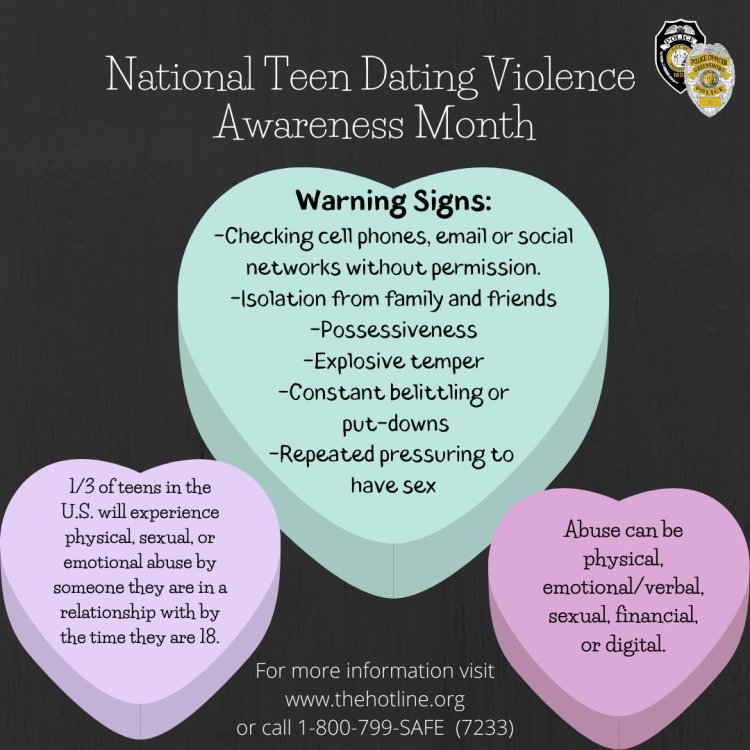10 Facts About Teen Dating Violence
Teen dating violence is a problem of epidemic proportions that has plagued our nation for decades.

Teenagers are notoriously difficult to control in today's technological world.
They have lots of resources at their disposal, including numerous dating apps. It becomes difficult to monitor their interactions, conversations, and the disclosure of private information.
26% of teenage girls and 15% of teenage boys have been victims of dating violence before they turned 18.
This disturbing trend can be stopped, however, provided we create a safe environment in which young people feel comfortable disclosing their harrowing experiences.
not passing judgment on them. Let's get a handle on what constitutes dating violence and how to recognize it.

What is dating violence?
As the term "dating violence" implies, it occurs between a man and a woman who are dating.
They've started dating and have begun sharing intimate moments together.
This happens when one partner begins to physically or verbally abuse the other.
This could include injuring or beating someone physically, engaging in sexual activity without their consent, or any other type of physical or sexual abuse.
There is also the use of non-verbal or verbal communication, as well as stalking and making contact with the partner's network, to instill a sense of fear in the victim.
For any adolescent who, because of their immaturity, is unable to
It's challenging to deal with someone whose conduct changes so suddenly.
They may withdraw into sadness, refuse to acknowledge their feelings, and ultimately choose to remain in an abusive relationship or take their own life. Paying close attention to your partner's words and deeds is the only way to prevent a potentially disastrous scenario.
Getting out of a bad relationship is easier if you do it quickly, but it can be tough if you wait too long.
5 types of dating violence
The first step is recognizing that indicators of dating violence are not always visible.
Therefore, it's important to be aware of the various red flags associated with domestic and dating abuse.
Understanding domestic violence will allow us to see beyond people's facades. This information will be useful if you think you or someone you know is experiencing dating violence.
1. Physical abuse
Physical abuse is a major warning sign in a violent relationship. As the term "abuse" implies, this type of behavior involves the use of force (e.g., slapping, hitting, shoving, pinching, biting, pulling hair, kicking, etc.) to cause harm to another person.
Refusing to get medical attention for a sick or injured partner can also considered physical abuse.
It is also physically abusive to coerce another person to consume drugs, alcohol, or any other illegal substance.
2. Psychological abuse

The indicators of violence are not always obvious. Elements of psychological maltreatment are present here.
In this type of abuse, the abuser attempts to control their victim by the use of fear, threats, extortion, or physical separation. Abuse of the mind can take many forms.
It is already psychological abuse if you aren't allowed to communicate with your loved ones. It's not uncommon for victims of this kind of abuse to be blissfully unaware that it's occurring to them.
3. Sexual abuse
One of the most common forms of sexual abuse is coercion, or the attempt to force sexual contact or activity.
One of the telltale indicators of someone who is aggressive is pressuring their partner to engage in oral sex or BDSM against their will. Rape is a sort of sexual abuse that can happen to anyone, regardless of marital or long-term status.
If you're asking, yes, this includes not using a condom or sabotaging other forms of birth control.
4. Emotional abuse
Bruises are not the only visible warning sign of domestic violence. The effects of emotional abuse are just as devastating.
It is already abuse if your partner constantly criticizes you and puts you down, gaslights you, and undermines your sense of self-worth.

5. Economic abuse
Perhaps you've never come across this term before. When someone is accused of economic abuse, they are accused of having complete control over their partner's financial resources.
The abuser would either keep the money for themselves, prevent the victim from accessing their finances, or ban them from providing for their loved ones.
Now that you know what constitutes abuse, you should look into the indicators of abuse.
Some of the early warning indicators of dating violence among teenagers are outlined here.
10 warning signs of dating violence
Intimate partner violence is frequently hidden or rejected because of passionate feelings for the abuser. People may be ignorant and unable to recognize the signs of relationship violence. Here are some telltale signs of abuse in a romantic relationship:
1. Possessiveness
Everyone has the inherent right to go about their own business and pursue their own happiness.
No adolescent would gladly submit to their parents' constant vigilance throughout their development. This guideline should not be applied to your significant other. You shouldn't let your lover dictate your every move. They can be caring for you, but not possessive.
They need to let you have some personal space and shouldn't get in the way. Be wary of a spouse who seems overly concerned about protecting you. This could develop into possessiveness, which could make your life unbearable.
2. Unexpected anger
Everyone has the inherent right to go about their own business and pursue their own happiness.
A relationship's ups and downs are normal.
Nothing to worry about, as everyone goes through similar experiences. However, there are many who, for no apparent reason, become excessively abusive to their relationships. They are impolite, quick to anger, and will vent their frustrations in front of everyone.
These actions indicate an interest in abusive relationships.
It's best for you to get away from that person as quickly as possible.
No adolescent would gladly submit to their parents' constant vigilance throughout their development. This guideline should not be applied to your significant other. You shouldn't let your lover dictate your every move. They can be caring for you, but not possessive.
They need to let you have some personal space and shouldn't get in the way. Be wary of a spouse who seems overly concerned about protecting you. This could develop into possessiveness, which could make your life unbearable.
3. Getting sexual without consent
You and your date will share some passionate moments together. Consent is the foundation of all sexual encounters. Under no circumstances is it acceptable for someone to use physical force to coerce you into sexual activity.
When we're in our teens, our bodies go through a lot of changes.
Even if physical desire can win out over reason at times, no one has the right to trample all over you or coerce you into sexual behavior. If your spouse is trying to do that, discuss with your parents.
You deserve to be treated with respect, and engaging in sexual activity without your partner's permission is a symptom of abusive relationships.
4. Blaming you for everything bad
As noted, every relationship encounters a tough patch at least once in its lifespan.
Real life might be tough to deal with at times like these, but pointing fingers isn't the answer.
Dating violence occurs when one partner consistently places blame for the relationship's problems on the other. Since there are two people in a dating relationship, each partner shares the blame.
Therefore, avoid being your partner's easy scapegoat.
5. Making threats
No one has the right to make any form of threat when in a relationship or even just dating.
However, some people have been seen to make threats to their spouse, such as ruining their life, not letting them have peace if they leave, etc. Such intimidation is never appropriate, and no one has to put up with it.
6. Isolation from your family and friends
If you're dating someone and you've noticed that they've been trying to isolate you, it could be an indication of abuse.
This person will likely attempt to drive a wedge between you and your pals at first. They are no longer available for contact or socializing.
Then, you might discover that your partner is constantly interrupting your plans to spend time with your loved ones.
One day you may wake up to the reality that you've cut off all contact with the people who could assist you get away from your abuser.
I can't fathom why they'd do it. Despite the fact that the aforementioned individuals could be of assistance to you, the controlling individual desires to have them removed from your existence.
7. Monitoring your social media accounts
There is never an excuse for violence in any relationship, whether it is a teen dating relationship or an established one. Don't forget it.
It may start when your lover stalks your social media accounts and would suddenly read your messages. For some, this may represent an act of trust and love, but is it really?
When it comes to your social media accounts, this individual expects you to be completely open, but if you try to do the same with your partner, you can expect to hear harsh remarks and even insults.
If you think that's unjust, you'd be correct. This is because your partner's history of violent behavior is a red flag.
8. Verbal and emotional abuse
One need not be an expert to recognize the harmful nature of verbal and emotional abuse. They are harmful to one's mental and emotional well-being and should be avoided at all costs.
Unfortunately, when it's just the two of you, we have no idea what's going on.
The use of demeaning language, withholding of affection, and refusal to acknowledge your existence are all symptoms of emotional and verbal abuse.
9. Invades your privacy
Taking advantage of relationship counseling is a great way to improve your interpersonal skills. One of these situations is when your partner deserves your undivided attention.
What should you do if you're dating an abusive person? So then what?
This person would storm into your house, take everything, answer your texts and emails, and cancel any upcoming travels or appointments.
The implication of this is. This person obviously doesn't care about you or respect you in any way.
10. Physically hurts you
These are the most blatant indicators of domestic violence. Whether you've been dating for a day, a week, or a decade, physical abuse is never acceptable.
Some people, however, would stay in the relationship in the hopes that their partner would eventually change or that it was just an isolated incident.
Sadly, that won't be the case. This is a characteristic of every abuser.
Abuse is abuse, whether it takes the form of a slap, a push, a punch, or the hurling of a kitchen equipment.
How to deal with dating violence
If you recognize yourself in any of these symptoms, you may be a victim of violence.
Don't chalk up your partner's aggressive actions to coincidence or blame yourself. This must end, and you’re probably wondering where to begin.
Here are five strategies to learn what to do if you're in an abusive relationship.
Please share this with other people. Before things may get out of hand, your partner is already blocking you from reaching out. Get some assistance if you need it.
Tell the individuals you care about what's going on behind closed doors by calling them up.
If you need help with your studies, see your professor or advisor. Contacting your folks or close pals is another option.
2. End the relationship/dating
If your partner is abusive, you have options. Never ignore the warning indications of a potentially violent partner.
Don't try to explain away your partner's reaction to triggers by defending their conduct or the circumstances. If you don't end the abuse right now, you'll be stuck in an abusive relationship forever.
3. Spend time with the right people
You may need some assistance getting back on track once you've successfully completed the dating phase or the first few months of being a couple.
Not a problem. Abuse can do this to otherwise remarkable people like yourself. It's possible to get back up again, though. Spend more time with the people that bring out the best in you.
Get busy doing anything to divert your thoughts. Most importantly, always keep in mind how incredible you are.
4. Get help from a licensed professional
What if so much has happened to you in such a short amount of time? What if you've been abused not just mentally but also emotionally and physically?
You feel broken even though you've ended the relationship.
This is where soliciting assistance can do wonders. Get a referral from someone you believe in and go see a professional counselor.
Be honest and let the therapist help you get through your
5. Call NDVH
There are various forms of relationship abuse, and occasionally your very life is in danger.
Don't be afraid to tell an adult, teacher, or principal about it, or to call the National Domestic Violence Hotline at 800-799-SAFE (7233).
Keep in mind that you deserve to be treated with respect and that you should never put up with abuse.
Abuse in dating relationships is more widespread than people realize, yet victims often struggle to get the information they need to get the care they need and go on with their lives.












